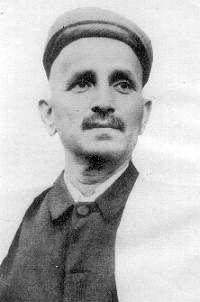Vishnu Narayan Bhatkhande

Pandit Vishnu Narayan Bhatkhande (August 10, 1860 - September 19, 1936) was an Hindustani classical musician widely acclaimed to have brought in a rennaisance in Hindustani music. He reorganized the Ragas in Hindustani music into the currently used That scale from the previous classification into Raag (male), Ragini (female) and Putra (children) ragas.
Early life
Vishnu Narayan Bhatkhande was born in 1860 on the day of Janmashtami, a holy day for Hindus. He was born into a Marathi family in Balukeshwar, Mumbai. In his childhood he was known as Gajanan. He was educated at the Elphinston College in Mumbai and Deccan College in Pune. He graduated with a degree in Law in 1885 and joined legal profession in 1887 and later also served a short stint as a lawyer in the High Court in Karachi. He began learning the sitar from Shri Vallabhdas during his college days. He later learnt vocal music from Raojiba, a Dhrupad singer. He also trained in other aspects of classical music from other teachers like Belbagkar, Ali Husain Khan, Vilayat Hussain Khan and others. He also joined the Gayan Uttejak Mandali a musical circle in Mumbai.
Research in music
Bhatkhande begantouring the entire country for research in music meeting with ustads and pandits. He began the study of well-known ancient texts such as the Bharat Natya Shastra and Sangeet Ratnakar. After the death of his wife and his daughter, Bhatkhande abandoned his legal practice and devoted the rest of his life to the aim of systemising the prevailing forms of Hundustani music and building on there basis a systematic and coordinated theory and practice of music. He wasvery much concerned with the disappearing patronage of musicians from various princes. During his tour of India, he spent some time at Baroda, Gwalior and Rampur and collected some precious works of Tansen. Ustads like Mohammad Ali Khan, Asgar Ali Khan and Ahmed Ali Khan of Jaipur gave him more than 300 precious compositions of the Manarang Gharana thereby helping him immensely.
After this research he started publishing the resuls of his findings. His first work Swar Mallika was a small booklet which contained detailed descriptions of all Ragas prevalant during that time. In 1909 he published the Shri Mallakshaya Sangeetam and then published his first book Hindustani Sangeet Paddhati in four volumes. Even today these volumes are the only standard treaties on Hindustani music. All his works were published under the pen-names Vishnu Sharma or Chaturpandit.
Institutions
Bhatkhande aimed to start music schools and colleges for systematic teaching of music in India. In 1916 he reorganised the Baroda state music school and later with the help of the Maharaja of Gwalior established the Madhav Music College at Gwalior. In 1926 Morris College of Music was established in Lucknow for which he prepared the course material. He prepared the Hindustani Sangeet Karmik Pustak Mallika as a series of standard textbooks. He also started the tradition of the All India Music Conferences to provide a common platform for discussion between Hindustani and Carnatic classical musicians.
Death and legacy
Bhatkhade became bedridden due to an attack paralysis and thigh fracture. He passed away on Ganesh Chaturti, another auspicious dy for Hindus, in 1936. Ever year during the Ganesh Chaturti week, musicians from all over the country pay homage to Bhatkhande. The Posts and Telegraph Department of India also payed homage to Pandit Vishnu Narayan Bhatkhande by releasing a commemorative stamp portraying Bhatkhande on September 1 1961. That particular date was chosed as it was Janmashtami on that day.
Bibliography
- Shri Mal-Lakshya Sangeetam - A treatise on the theory of Music in Sanskrit in slokas and describing the important ragas.
- Lakshan Geet Sangrah in three parts. Compositions descriptive of the Ragas, giving their characteristics in songs composed by Pandit Bhatkhande.
- Hindustani Sangeet Paddhati in 4 parts - A commentary on the Lakshya Sangeetam in Marathi. It is a detailed study and discussion of the theory of music and explanation of 150 Ragas of Hindustani music. This important work has been translated into Hindi.
- Kramik Pustak Malika - This book was published in six parts. It is a detailed textbook of Hindustani music, describing all the important Ragas, their theory and illustrated with well-known compositions in notations. It contains about 1,200 such compositions.
- Swara Malika (in Gujarati characters) Notation of Ragas in swara and tala.
- A comparative Study of the Music Systems of the 15th, 16th, 17th and 18th Centuries (in English).
- Historical Survey of the Music of India.
- Geet Malika - which was originally published in 23 monthly issues, each containing 25 to 30 classical compositions of Hindustani Sangeet in notation.
- Abhinav Raga Manjari - A treatise on the Ragas of Hindustani music, each being described briefly in one sloka in Sanskrit.
- Abhinav Tala Manjari - A textbook in Sanskrit on the Talas
Old manuscripts edited by him:
- Swara Mela Kalanidhi by Ramamatya
- Chaturdandi Prakashika by Venkatmakhi
- Raga Lakshanam
- Raga Tarangini by Lochan
- Raga Tatva Vibodh by Shriniwas
- Sadraga Chandrodaya by Pundarik Vithal
- Raga Manjari by Pundarik Vithal
- Raga Mala" by Pundarik Vithal
- Nartan Niranaya by Kashinath Shashtri Appa Tulsi
- Sangeet Sudhakar by Kashinath Shashtri Appa Tulsi
- Sangeet Kalp Drumankur by Kashinath Shashtri Appa Tulsi
- Raga Chandrika by Kashinath Shashtri Appa Tulsi
- Raga Chandrika Sar (Hindi)
